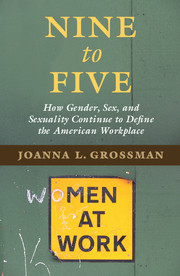Book contents
- Frontmatter
- Dedication
- Contents
- Foreword
- Acknowledgments
- Introduction
- PART I WHAT IS SEX DISCRIMINATION?
- PART II SEXUAL HARASSMENT
- 12 Workplace Affairs and Sexual Favoritism
- 13 Lolita at the Office
- 14 Sex Talk in the Writers’ Room
- 15 Sex Behind Bars
- 16 When the Supervisor Bullies Only Women
- 17 The Equal Opportunity Harasser
- 18 Periodontal Perils
- 19 Punishing Effeminacy
- 20 Late-Night Affairs with David Letterman
- 21 Why Herman Cain Has Not Been Able to Talk His Way Out of His Exploding Sexual Harassment Scandal
- 22 Why Hostile Environment Harassment Is a “Continuing Violation”
- 23 When Sexual Extortion Is Successful
- 24 The Consequences of Failing to Complain about Harassment
- 25 Who Is Responsible for Sudden, Severe Harassment?
- 26 Chinks in the Harassment Law Armor
- 27 Do Employer Efforts Prevent Harassment or Just Prevent Liability?
- 28 Who's the Boss?
- 29 Costly Mistakes
- 30 Hands Off the Merchandise
- PART III PREGNANT WOMEN AND MOTHERS AT WORK
- PART IV FEMALE BREADWINNERS AND THE GLASS CEILING
- Conclusion
- Notes
- Index
17 - The Equal Opportunity Harasser
from PART II - SEXUAL HARASSMENT
Published online by Cambridge University Press: 05 May 2016
- Frontmatter
- Dedication
- Contents
- Foreword
- Acknowledgments
- Introduction
- PART I WHAT IS SEX DISCRIMINATION?
- PART II SEXUAL HARASSMENT
- 12 Workplace Affairs and Sexual Favoritism
- 13 Lolita at the Office
- 14 Sex Talk in the Writers’ Room
- 15 Sex Behind Bars
- 16 When the Supervisor Bullies Only Women
- 17 The Equal Opportunity Harasser
- 18 Periodontal Perils
- 19 Punishing Effeminacy
- 20 Late-Night Affairs with David Letterman
- 21 Why Herman Cain Has Not Been Able to Talk His Way Out of His Exploding Sexual Harassment Scandal
- 22 Why Hostile Environment Harassment Is a “Continuing Violation”
- 23 When Sexual Extortion Is Successful
- 24 The Consequences of Failing to Complain about Harassment
- 25 Who Is Responsible for Sudden, Severe Harassment?
- 26 Chinks in the Harassment Law Armor
- 27 Do Employer Efforts Prevent Harassment or Just Prevent Liability?
- 28 Who's the Boss?
- 29 Costly Mistakes
- 30 Hands Off the Merchandise
- PART III PREGNANT WOMEN AND MOTHERS AT WORK
- PART IV FEMALE BREADWINNERS AND THE GLASS CEILING
- Conclusion
- Notes
- Index
Summary
Connecticut fire chief Marquam Johnson may be the man academics like to hypothesize about, a true equal opportunity harasser who is alleged to have harassed both men and women in equally sexual, and equally offensive, ways.
According to complaints from a male deputy, Johnson grabs men by their testicles, gooses them, and puts his hands in their front pockets so he can simulate having anal sex with them. According to complaints from a female secretary, he whacks her on the buttocks and makes comments about the size of her breasts.
Both the male deputy and the female secretary have filed lawsuits against the Torrington, Connecticut, fire department, alleging that Johnson's conduct created a sexually hostile working environment in violation of Title VII, the federal antidiscrimination statute. Both contend, as they must to prevail, that they were harassed because of their sex.
But can it really be the case that both the man and the woman were harassed because of their sex, as Title VII requires? Might it be more accurate to say that if all the allegations against him are true, Johnson harasses regardless of sex, not because of it? Or, put another way, is Johnson's alleged harassment so indiscriminate that while it may constitute a tort, it does not constitute unlawful discrimination in violation of federal civil rights laws?
THE “BECAUSE OF SEX” REQUIREMENT
As discussed in Chapters 15 and 16, Title VII only prohibits harassment that occurs “because of sex” – it is that hook that distinguishes actionable discrimination from merely bad behavior. The long and hard-fought battle to bring same-sex harassment within the ambit of Title VII was what focused emphasis on the statutory requirement that harassment be “because of sex” in order for suit to be brought.
Title VII's “because of sex” requirement, however, has turned out to be more difficult to interpret than courts initially believed. For instance, the reasoning that says sexual harassment comes from opposite-sex desire, and is thus inherently “because of sex,” breaks down when the harassing supervisor is bisexual. If a bisexual supervisor gropes a female subordinate, he or she may well do the same thing to a male subordinate, thus undermining the female victim's claim that she was harassed because of her sex.
- Type
- Chapter
- Information
- Nine to FiveHow Gender, Sex, and Sexuality Continue to Define the American Workplace, pp. 106 - 108Publisher: Cambridge University PressPrint publication year: 2016

